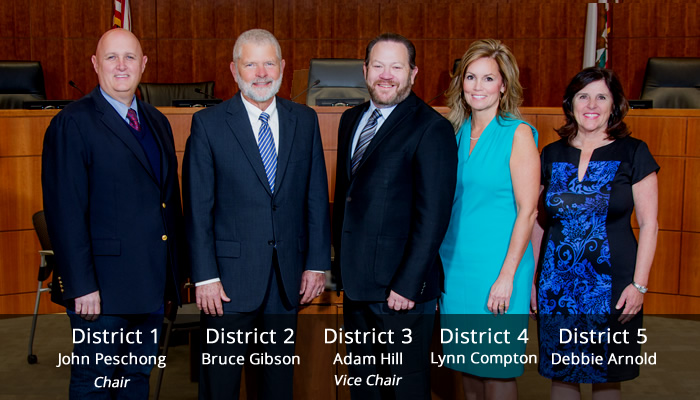Allegations fly at board majority after Gibson, Hill lose groundwater vote
March 22, 2017
With control over the Paso Robles groundwater basin at stake, the minority on the San Luis Obispo County Board of Supervisors, as well as its supporters, are levying allegations that the board majority violated the Brown Act. As a result, the board is now scheduled to redo a vote on groundwater policy and to hold a separate discussion on possibly recommending a criminal investigation into the board majority.
Thus far, the county’s top attorney has said it appears that the conservative board majority did not violate the Brown Act in its handling of the groundwater management issue. Yet, while the board discussed the controversy on Tuesday, County Counsel Rita Neal warned Supervisor Bruce Gibson that he was teetering on the edge of prompting the board to violate the Brown Act.
Ever since North County voters rejected a planned water district last year, Gibson and Supervisor Adam Hill have been pushing for the state to take over management of the Paso Robles groundwater basin. However, the current board majority opposes that idea and supports local control.
A 2014 California law requires counties or local districts to manage groundwater basins that are in overdraft or turn over the responsibility over to the state. The state law sets a June 30 deadline to create groundwater sustainability agencies to manage basins in overdraft.
On March 7, the board of supervisors voted 3-2 to assume responsibility for managing groundwater basins in the county, rather than turning over the duty to the state.
In the aftermath of the hearing, supporters of Gibson and Hill criticized the vote and some of their supporters accused the board majority of violating the Brown Act. Supporters of Gibson and Hill, including the San Luis Obispo Tribune, argued the vote took place during a “receive and file” item on the board agenda, and thus, the public was not given an opportunity to weigh in on the decision.
However, County Counsel Rita Neal said the board complied with the Brown Act in its March 7 vote on groundwater management policy.
Nonetheless, at Tuesday’s meeting, about 10 public speakers criticized the March 7 vote and accused the board of violating the Brown Act. The speakers, by in large, belong to the SLO Progressives, a group that has been rallying behind Gibson and Hill in recent months.
Following the public comment period, the board voted unanimously to redo the vote on groundwater management.
In a separate but related manner, the board discussed an allegation by a supporter of a state run water district that supervisors Debbie Arnold, Lynn Compton and John Peschong violated the Brown Act by holding a serial meeting.
Paso Robles resident Laurie Gage forwarded a letter from Creston resident Greg Grewal that Gage said showed circumstantial evidence Arnold, Compton and Peschong privately agreed to adopt a new county policy on groundwater management.
In the letter, Grewal, who is Arnold’s appointee to the county Water Resources Advisory Committee, stated he had various confidential conversations with supervisors, and he knew the board would decide to maintain local control of groundwater management.
Both Compton and Peschong, however, told CalCoastNews they never met with Grewal to discuss the issue. Peschong also said during last year’s campaign, he participated in a total of 13 debates, and in every debate he stated he was against state management of local groundwater.
“It was not a secret,” Peschong said. “I have been saying for a year that I do not want California to take over our water districts.”
Nonetheless, Gibson and Hill said the serial meeting allegation warranted an investigation by the county district attorney’s office.
Gibson made a motion to forward the issue to the district attorney’s office. But, Neal then said voting to send the issue to the district attorney without the item being agendized could itself violate the Brown Act.
After receiving the county counsel’s warning, Gibson made a new motion to place a discussion on the alleged serial meeting on a future board agenda. The board then voted unanimously in favor of Gibson’s motion.
As a result of the two votes on the alleged Brown Act violations, on April 4, the board will both revote on the groundwater management policy and renew its discussion on the the purported serial meeting.
The Ralph M. Brown Act is a stringent California open-meetings law that requires legislative bodies to conduct their business in public view.







The comments below represent the opinion of the writer and do not represent the views or policies of CalCoastNews.com. Please address the Policies, events and arguments, not the person. Constructive debate is good; mockery, taunting, and name calling is not. Comment Guidelines